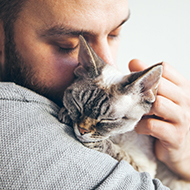Time with cats can combat loneliness, report concludes

The report makes a series of recommendations to help people struggling with loneliness.
Spending time in the company of cats can help to tackle loneliness, a report by the All-Party Parliamentary Group on Cats (APGOCATS) has concluded.
The report, released to coincide with Loneliness Awareness Week, suggests that cat ownership and interaction is one of several measures with the potential to tackle loneliness across all age groups in specific social situations.
It also makes a series of recommendations for care providers, welfare charities and Government to explore allowing and encouraging people who are struggling with loneliness to interact with cats.
Among the recommendations includes a call for prescribing social time with cats, either through volunteering or fostering felines for animal rescues or, if appropriate, getting a cat as a pet.
Other recommendations include encouraging housing providers to allow more renters to own or foster cats; health care providers to be able to access information on cat care, and animal welfare organisations to widely share advice about owning and caring for cats.
“As a cat owner I have always found great pleasure and happiness from having cats in my life and can testify to how they can be great companions and provide love, support and enjoyment,” commented Sheryll Murray MP, Chair of APGOCATS.
“Tackling loneliness is a priority health issue facing many across the UK. The role cats and other pets can play to help tackle the problem is under-researched and merits further attention. I very much look forward to taking forward the report recommendations.”
APGOCATS is made up of a group of MPs, peers and associate organisations with an interest in feline welfare. Supported by numerous animal welfare organisations, including Battersea, Blue Cross and Cats Protection, the group seeks to support discussion and debate about what politicians and the Government can do to further the welfare of cats.
“I very much welcome this report by APGOCATS which has been compiled by organisations and experts that care about both cats and people," commented Robin Hewings, director of campaigns, policy and research at the Campaign to End Loneliness.
"It is clear that the role of cats in combating loneliness is under-explored and this report goes a long way to highlighting the many ways they can help. There is no simple cure for loneliness, but there is clearly real potential for cats to have a more beneficial role in people’s lives, and I urge the Government to consider the findings of this report.”



 The Veterinary Medicines Directorate (VMD) is inviting applications from veterinary students to attend a one-week extramural studies (EMS) placement in July 2026.
The Veterinary Medicines Directorate (VMD) is inviting applications from veterinary students to attend a one-week extramural studies (EMS) placement in July 2026.